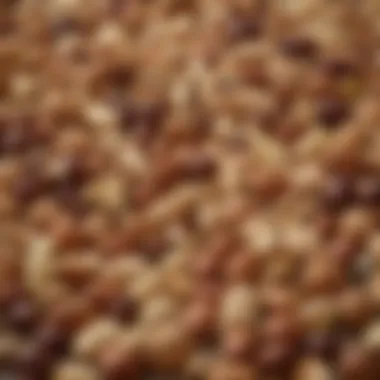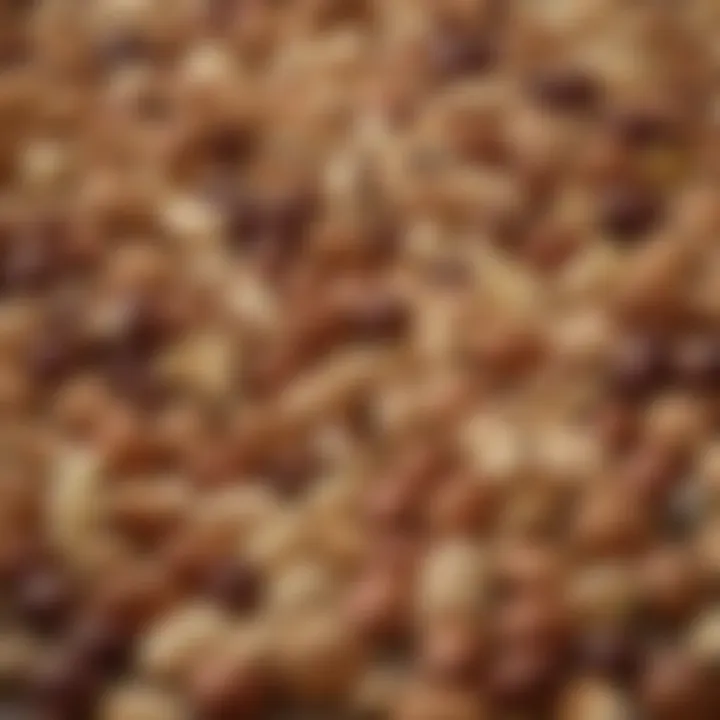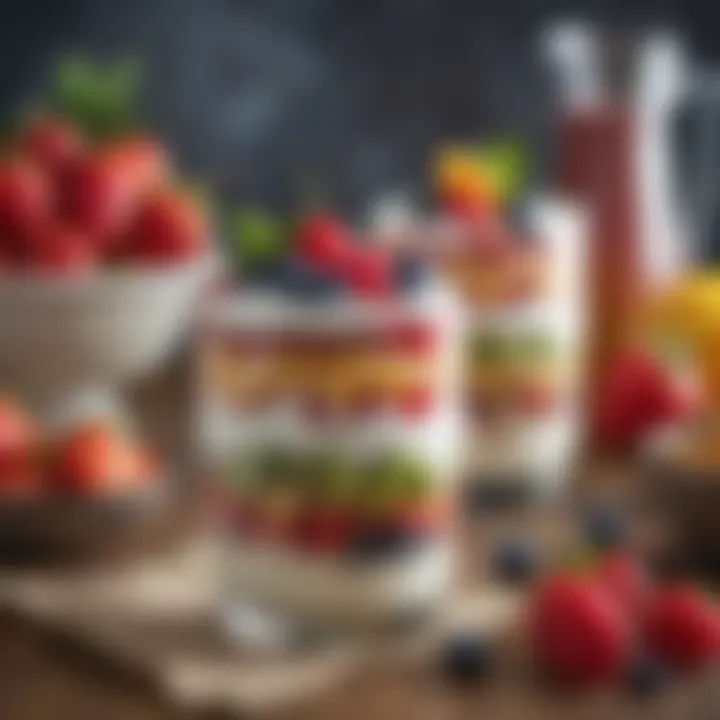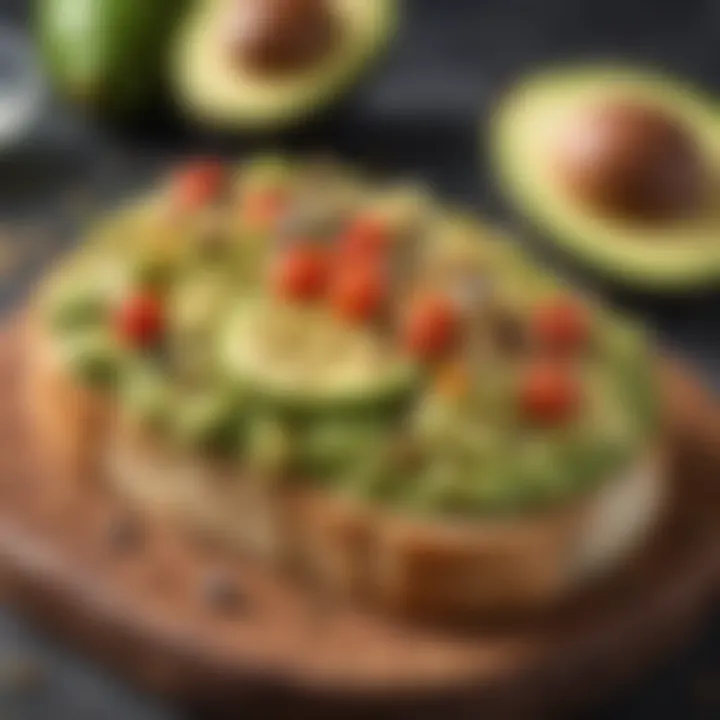Top Healthy Snacks for Effective Bulking


Intro
Bulking refers to a strategic phase in fitness and bodybuilding designed to increase muscle mass. During this period, individuals often find themselves searching for ways to consume more calories and essential nutrients. One of the effective ways to achieve this is by incorporating healthy snacks into the diet. Healthy snacks can bridge the gap between main meals, ensuring a consistent supply of energy and nutrition to support muscle growth and overall wellbeing.
The importance of selecting the right snacks cannot be understated. Many choices available on the market are high in sugars or unhealthy fats, which can hinder progress. Hence, opting for nutrient-dense snacks allows individuals to fuel their workouts effectively while adhering to their health goals. This advantage is significant since well-balanced nutrition not only enhances muscle mass but also contributes to optimal recovery.
In this article, we will explore various healthy snacks ideal for bulking. We will provide a variety of recipes, detailing the essential ingredients, possible substitutions, and insights on portion control. By the end, readers will have a deep understanding of how to efficiently incorporate these snacks into their dietary routines.
Understanding the Bulking Phase
To grasp the significance of healthy snacks during the bulking phase, it is essential to first understand what bulking entails. This phase is crucial for individuals looking to gain muscle mass and strength. The bulking phase typically involves consuming more calories than the body requires for maintenance, creating a caloric surplus that promotes muscle growth. However, the method of achieving this surplus can profoundly impact the individual's health and fitness journey.
Emphasis on nutrient-rich foods is vital in the bulking phase. Consuming high-calorie junk food may lead to weight gain, but it often includes high levels of trans fats and sugars which can harm overall health. Therefore, choosing healthy snacks that align with bulking goals is pivotal. These snacks can provide not just calories but also the necessary nutrients for muscle recovery and growth.
Additionally, the bulking phase should not focus solely on calories. Quality of calories matters significantly. One might consider macros like proteins, fats, and carbohydrates crucial during this phase. The right balance aids in muscle retention and recovery while minimizing unnecessary fat gain. Thus, understanding individual nutritional needs is paramount.
"The goal of bulking is not just to gain weight, but to ensure that muscle growth is maximized with minimal fat gain."
The Goals of Bulking
Understanding the goals of bulking is foundational to formulating an effective diet strategy. The primary purpose of bulking is to increase muscle size and strength. Numerous lifters and fitness enthusiasts aim for muscle hypertrophy, which requires more energy from food than retraining allows alone.
The bulk phase also serves to prepare the body for subsequent cutting phases. By increasing muscle mass first, individuals have more lean tissue to preserve when they reduce body fat. In summary, bulking aims for effective and strategic muscle growth, requiring thoughtful calorie management.
Nutritional Needs During Bulking
Nutritional needs during the bulking phase are diverse and specific. An increase in caloric intake is necessary, with a general recommendation of around 250 to 500 extra calories a day. However, simply increasing caloric intake isn't enough.
Protein emerges as one of the essential macronutrients. Studies suggest a daily intake of 1.6 to 2.2 grams of protein per kilogram of body weight is effective for muscle building. Foods like chicken, fish, legumes, and dairy should feature prominently in the bulking diet.
In addition to protein, carbohydrates serve as a primary fuel source. They provide energy for workouts and recovery. Sources include whole grains, fruits, and vegetables, which should all be incorporated systematically. Failing to meet carbohydrate needs can lead to fatigue during intense training.
Lastly, healthy fats also play a vital role in nutrient absorption and hormone production. Foods such as avocados, olive oil, and nuts can provide necessary calories while also contributing to overall health. Recognizing and meeting these nutritional demands during the bulking phase ultimately supports effective muscle growth and promotes long-term fitness success.
The Importance of Healthy Snacking
Healthy snacking plays a crucial role in the bulking phase. During this time, individuals aim to gain weight and build muscle, which requires a significant increase in caloric intake. Focusing on healthy snacks not only helps in reaching caloric goals but also ensures that the nutrients consumed are beneficial for overall health. Snacks provide an opportunity to include essential vitamins, minerals, and macronutrients that support muscle growth and recovery.
Nutrient Density vs. Caloric Intake
When selecting snacks, it is vital to consider both nutrient density and caloric intake. Nutrient-dense foods offer a higher amount of nutrients relative to their calorie content. For example, almonds are high in healthy fats, vitamins, and minerals while providing a manageable number of calories. In contrast, foods that are high in empty calories, like sugary snacks, may lead to weight gain without providing the necessary nutrients for muscle development and recovery. Choosing the right snacks can promote better energy levels and improve workout performance. A few examples of nutrient-dense snacks include:
- Greek yogurt with honey and nuts
- Whole grain toast topped with avocado
- Protein smoothies with fruits and spinach
Understanding this balance allows individuals to make informed choices that benefit both their bulking goals and overall health.
Timing Your Snacks
The timing of snacks during the bulking phase can affect energy levels and muscle recovery. For optimal results, it is crucial to spread snack consumption throughout the day, aligning them with workout routines. Consuming a healthy snack 30 to 60 minutes before exercise can help to provide adequate energy. After workouts, a snack with protein and carbohydrates can aid in muscle repair and replenish glycogen stores. Some effective timing strategies include:
- Eating a protein-rich snack like cottage cheese post-workout
- Consuming carbohydrates such as oatmeal pre-training
- Incorporating healthy fats with your snacks for sustained energy
By strategically timing snacks, individuals can maximize their results during the bulking process, ensuring that their bodies receive the necessary fuel when it is needed most.
Types of Healthy Snacks for Bulking
Healthy snacking plays a pivotal role in a bulking diet by providing vital nutrients and helping to meet increased caloric requirements. Bulking demands a strategic approach to nutrition, where the right snacks fuel muscle gain and enhance overall wellbeing. Choosing healthy snacks can help maintain energy levels throughout the day, support workout recovery, and promote muscle growth. This article will explore key categories of healthy snacks, emphasizing high-protein options, sources of healthy fats, carbohydrate-rich snacks, and fresh fruits and vegetables.
High-Protein Options
High-protein snacks are essential in a bulking phase as they directly contribute to muscle repair and growth. Incorporating protein-dense foods ensures the body receives adequate building blocks to enhance recovery and boost performance in workouts.
Greek Yogurt and Berries
Greek yogurt paired with berries offers a well-rounded snack. The high protein content of Greek yogurt makes it an excellent choice for muscle repair. It is also rich in probiotics, which can aid in gut health, something that might be overlooked but is crucial for overall performance.


The sweetness and texture of fresh berries enhance the flavor and add vitamins, fiber, and antioxidants. Berries are well known for their health benefits, and their low caloric value makes this combination an energizing option for any time of day. However, it’s important to choose versions with no added sugars.
Cottage Cheese with Nuts
Cottage cheese is another high-protein option. Its unique texture and taste make it a versatile snack that can be paired with various toppings. Adding nuts increases the healthy fat content, providing sustained energy. Nuts are also source of beneficial minerals and vitamins.
This combination provides a satisfying crunch and promotes satiety. Cottage cheese with nuts is not only nutrient-dense but also easy to prepare. Some may find the flavor of cottage cheese unappealing, but experimenting with spices or honey can elevate the taste.
Beef Jerky Choices
Beef jerky is a favoured high-protein snack that is convenient and portable. It contains a significant amount of protein and is low in carbohydrates when selecting varieties that are not sweetened or processed excessively. Beef jerky's ability to satisfy cravings makes it appealing, especially for those on-the-go.
While jerky is a great protein source, it is crucial to monitor sodium intake, as many brands can be high in salt. Opting for natural or organic versions can reduce these concerns while still delivering the necessary protein boost.
Healthy Fats Sources
Incorporating healthy fats into your diet is essential during the bulking phase as they provide concentrated calories and support hormone production. Sourcing fats wisely ensures that energy levels remain stable and provides the body with essential fatty acids.
Nut Butters
Nut butters, such as almond or peanut butter, are excellent sources of healthy fats. They are calorie-dense and packed with protein, making them an easy addition to various snacks. Their creamy texture is a perfect complement to many foods, including fruits and whole grain items.
Nut butters provide vitamins and minerals like magnesium and vitamin E, enhancing their health benefits. However, portion size should be monitored because of their calorie density, making it easy to consume more calories than intended.
Avocado Toast
Avocado toast is a modern classic and a nutritious option for healthy fats. Avocados are rich in monounsaturated fats, which are good for heart health. The creaminess of avocados elevates any base, whether it’s whole-grain bread or rice cakes.
Adding toppings, such as seeds or tomatoes, enhances the flavor spectrum and boosts nutrient content. Some may find avocados expensive or challenging to prepare; however, their versatility in recipes makes them worth the effort.
Trail Mix Combinations
Trail mix is a great way to combine various healthy fats. It can include nuts, seeds, and even some dried fruit for a twist. This snack is easily customizable, allowing a preference for taste and nutrient needs.
While trail mix can be calorie-rich, careful consideration of the ingredients ensures a healthy balance. Typically, it benefits the body with fiber, vitamins, and minerals, supporting the bulking goal effectively.
Carbohydrate-Rich Snacks
Carbohydrates are crucial for energy replenishment, especially post-workout. Healthy carbs aid muscle recovery and fuel subsequent workouts, making them a key player in any bulking phase.
Rice Cakes with Toppings
Rice cakes are light and versatile carbohydrate-rich snacks. They can be dressed with nut butter, ricotta cheese, or fresh fruit. They provide a quick source of energy due to their low fiber content, making them ideal before workouts.
A drawback is that rice cakes alone might lack substantial nutrients; thus, adding toppings can enhance their overall health profile. Many find them enjoyable for their crispiness and adaptability.
Oatmeal with Fruits
Oatmeal is well-regarded for its fiber content. Mixed with fruits, it becomes a powerhouse snack. The combination supports overall health while delivering slow-releasing energy, making it a suitable choice any time of day.
Oats can also assist in digestion and maintain cholesterol levels. Some might find traditional oatmeal bland; however, incorporating spices or sweeteners can transform it into a delightful treat.
Whole Grain Wraps
Whole grain wraps are an efficient way to consume carbohydrates while increasing dietary fiber. They can be filled with proteins, vegetables, or spreads, creating a balanced snack. Whole grain wraps are practical for meal prep and provide lasting energy, making them beneficial for those bulking.
The downside may be the need for prep work, and choosing a good quality wrap is essential. When selected wisely, they support diverse meal creations.
Fruits and Vegetables
Fruits and vegetables are often overlooked in the bulking phase. Their role in providing vitamins, minerals, and fiber cannot be overstated. They complement high-protein and carbohydrate snacks effectively.
Banana with Peanut Butter
Bananas paired with peanut butter provide a convenient snack option. This combination delivers simple carbohydrates for quick energy along with healthy fats and protein. The taste is enjoyable, and even novice cooks can prepare it with ease.
Although fairly nutritious, some people may want to limit total caloric intake if consuming multiple servings of peanut butter frequently. Balance is key to adhering to a healthy diet.


Carrot Sticks with Hummus
Carrot sticks with hummus combine well for a crunchy, satisfying snack. Carrots are high in fiber and beta-carotene while hummus supplies protein and healthy fats. This pairing offers a distinct texture mix, appealing to various taste preferences.
They can be easy to prep and consume but might not provide enough calories for hardcore bulking needs without additional pairings. Overall, they are a refreshing, nutrient-dense choice.
Apple Slices with Cheese
Slicing apples and pairing them with cheese creates an excellent sweet-savory contrast that many find enjoyable. Apples provide vital fiber and hydration while cheese contributes protein and fat. This combination is easy to prepare, making it suitable for on-the-go snacking.
The challenge might arise for those who are lactose intolerant or prefer dairy-free options, and in those cases, alternatives may be needed to achieve similar flavor and texture.
Homemade Snack Recipes
In the context of bulking, homemade snacks can be extremely advantageous. They allow one to control the ingredients, ensuring nutritional quality and tailor them for specific dietary needs. Preparing snacks at home can also be a cost-effective strategy compared to purchasing ready-made options, which often carry higher price tags and may contain preservatives or additives not beneficial for health.
Furthermore, homemade snacks can be made in larger batches. This means they are conveniently available when hunger strikes, offering a practical solution for nutrition on the go. The ability to customize flavors and textures to personal preference contributes greatly to enjoying the snacking experience.
Protein Bars
Ingredients and Preparation
When making protein bars, the key ingredient choices are essential. Ingredients including oats, protein powder, nut butter, and natural sweeteners like honey or maple syrup are fundamental. These components not only provide macronutrients but also incorporate a mix of fiber and healthy fats.
The preparation of these bars is often straightforward and requires minimal cooking skills. Typically, one combines the ingredients, presses them into a pan, and allows them to chill in the refrigerator. This simplicity makes the bars accessible to many home cooks.
The unique feature of these bars is their flexibility. They can be made to fit virtually any taste preference. However, one must be cautious with ingredient portions. Too much added sweetener can lead to excess sugars. Therefore, moderation is key in maintaining nutritional integrity while preparing these homemade delights.
Customizing Your Bars
Customizing protein bars offers creativity and personalization. Adding favorite ingredients such as chocolate chips, seeds, or dried fruits can enhance flavor and texture. Each addition can provide distinct health benefits.
This flexibility is a key characteristic that makes protein bars popular. It empowers individuals to adjust recipes according to their nutritional goals and taste preferences. Customization ensures that the bars are exciting enough to enjoy regularly, preventing monotony in one's diet.
However, there can be a downside to customization. Adding too many extra ingredients might complicate the recipe, leading to an imbalanced nutritional profile if not carefully managed. This aspect should be kept in mind during the preparation process.
Energy Balls
Simple Recipes
Energy balls are another appealing option. They are very simple to make, often requiring no baking and just a few basic ingredients. Common components include oats, nut butter, honey, and mix-ins like chia seeds and dark chocolate chips.
The simplicity of these recipes makes them a beneficial choice. They can be whipped up quickly, making them perfect for busy lifestyles. Plus, they can serve as a quick burst of energy before or after workouts.
A unique feature of energy balls is their versatility. They can be tailored to suit different tastes and they store well, allowing for enjoyment throughout the week. However, with this ease comes the need to be mindful of portion size, as they can be calorie-dense despite their small size.
Storage Tips
Proper storage of energy balls is crucial for maintaining freshness and flavor. Keeping them in airtight containers in the refrigerator can extend their shelf life. They can also be frozen for longer periods, making it easy to prep snacks in advance.
This characteristic of storage is especially beneficial for those managing busy schedules or looking to meal prep efficiently. Freezing allows for convenient access to healthy snacks at any given time without losing nutritional value.
On the other hand, if they are not stored correctly, energy balls can quickly lose their quality, becoming stale or unappetizing. Consistent attention to storage methods is essential for ensuring these snacks remain enjoyable over time.
Nut Mix Variations
Flavor Combinations
Nut mixes present another satisfying option for healthy snacking. The blend of nuts can provide an exciting array of flavors, making each handful delightful. Common combinations include almonds, walnuts, and cashews. They can be seasoned with spices like cinnamon or cayenne for added zest.
This feature of flavor combinations is a great advantage. It invites creativity and can prevent boredom associated with snacking. Moreover, the blend of different nuts contributes to a wide range of nutrients, from healthy fats to proteins.
However, one should be cautious with portion sizes, as nuts can be calorically dense. Overindulgence can derail bulking goals, making portion control important when enjoying nut mixes.
Health Benefits
Nut mixes deliver numerous health benefits that are significant for a bulking diet. They are a great source of healthy fats, protein, and essential vitamins and minerals. Additionally, nuts can help promote satiety, which is crucial in managing overall dietary intake.


This characteristic is beneficial for those looking to gain muscle without excessive fat gain. Nuts also provide energy needed for workouts, making them a strategic choice.
Despite their advantages, nuts can cause allergies in some individuals, which is a downside that warrants caution. Care should be taken to ensure that any nut mix is free from allergens for those who are sensitive.
Managing Portions and Frequency
When it comes to bulking, managing portion sizes and frequency of snacks plays a crucial role in supporting muscle growth and overall health. Simply eating more calories is not always the answer; it is about how and when those calories are consumed. Proper portion control helps prevent excessive weight gain and ensures that the body receives adequate nutrients for recovery and muscle synthesis. Moreover, a structured approach to snacking can maintain energy levels throughout the day, which is essential during intense training phases.
A balanced intake of nutrients through various snacks allows you to meet your caloric goals effectively without compromising quality. By focusing on nutrient-dense options, bulking individuals can avoid the pitfalls of processed snacks, which often lead to unwanted fat gain.
Portion Control Techniques
Portion control is especially important for those who aim to bulk up without gaining excessive fat. Here are some effective techniques to consider:
- Use Measuring Tools: Invest in measuring cups, food scales, or portion control containers to understand the right amount for different snacks.
- Pre-Pack Snacks: Preparing and packaging snacks ahead of time can help you stick to portion sizes. Consider making snack bags with nuts or sliced fruits.
- Mindful Eating: Pay attention to hunger cues and eat slowly. It helps to recognize when you are satisfied, reducing the risk of overeating.
- Visual References: Use your hand as a guide; for example, a fist-sized portion of carbohydrates is a good benchmark, while a palm-sized portion is suitable for protein.
Incorporating these techniques can contribute to better dietary habits and a more mindful approach to eating during the bulking phase.
Setting a Snack Routine
Establishing a snack routine is beneficial for maintaining consistent nutrient intake throughout the day. A structured eating schedule can help in several ways:
- Regular Nutrient Supply: The body requires a continuous supply of nutrients, especially when engaging in rigorous physical activities. Timing snacks wisely can frame your daily intake effectively.
- Prevent Energy Dips: Regular snacking helps manage energy levels, preventing fatigue during workouts and promoting sustained performance.
- Convenience: Having a fixed time and variety for snacks allows for convenience, making it less likely to reach for unhealthy options when hunger strikes.
To implement a snack routine:
- Plan Ahead: Select specific times during the day for snacks; aim for every 2-3 hours to keep energy levels stable.
- Diversify Snack Options: Include a variety of snacks in your routine to meet different nutritional needs and keep meals interesting.
- Track Intake: Keeping a food diary or using a nutrition app can help you track snacks and ensure you are meeting your caloric goals.
A systematic approach to managing portions and establishing a consistent snack routine can significantly enhance the bulking experience, ensuring nutritious intake, effective gains, and overall health.
Potential Pitfalls to Avoid
In the pursuit of muscle growth and enhanced performance, it is crucial to be aware of certain pitfalls in snack choices. Many individuals overlook how some options may hinder their bulking efforts. Recognizing these pitfalls can help in making informed decisions. The objective is to achieve a balanced and effective bulking diet while avoiding unnecessary setbacks.
Processed Snack Options
Processed snacks are often marketed as convenient but can defeat the purpose of healthy bulking. These snacks, such as chips or sugary granola bars, frequently contain high levels of unhealthy fats, sugars, and additives. Their calorie content may be high, yet they often lack essential nutrients necessary for muscle growth. Therefore, replacing these options with whole, nutrient-dense foods is essential. Some points to consider include:
- High Sugar Content: Processed snacks can cause blood sugar spikes, leading to energy crashes.
- Lack of Proteins: Many processed snacks are low in protein, an important macronutrient for muscle recovery.
- Additives and Preservatives: These can lead to inflammation and digestive issues.
It's more beneficial to choose snacks like nuts, whole fruits, and homemade options that provide the sustenance needed for effective bulking.
Over-Reliance on Supplements
Supplements can have their place in a bulking diet, but dependency on them can become a pitfall. Many individuals lean too heavily on protein powders or meal replacements, thinking they can replace whole foods. This approach leads to several concerns:
- Imbalanced Nutrition: Whole foods offer a wide range of vitamins, minerals, and phytonutrients that supplements cannot fully replicate.
- Digestive Issues: Overconsumption of protein supplements can cause discomfort and disrupt digestive health.
- Cost Effectiveness: Regular use of protein powders can strain a budget, whereas natural food sources may be more economical in the long run.
Consequently, a focus on whole foods should remain a priority. Aim for a balanced diet that incorporates a variety of healthy snacks to ensure you cover all nutrient bases.
"A successful bulking phase relies on the quality of calories consumed, not just the quantity."
By understanding these potential pitfalls, individuals can make more conscious choices that align with their bulking goals. Incorporating whole foods and being cautious with processed items and supplements can support a more effective and sustainable bulking strategy.
Finale
In the context of this article, the conclusion serves as a critical synthesis of the insights and guidance provided throughout. Healthy snacks are not merely optional extras in a bulking diet; they are foundational elements that support muscle growth and overall wellness. In recap, the article has established how strategic snacking aligns with nutritional goals, aiding in achieving the necessary caloric surplus for effective bulking.
In the journey towards muscle gain, the highlighted categories of snacks—ranging from high-protein options to carbohydrate-rich choices—offer diverse avenues for fitting nutritious foods into busy lifestyles. Each category presents unique benefits. For instance, high-protein snacks such as Greek yogurt and cottage cheese supply essential amino acids vital for muscle repair. Similarly, healthy fats found in nut butters and avocados contribute to sustained energy levels.
Moreover, timing your snacks plays a significant role in optimizing energy availability for workouts. Consuming snacks before or after exercises can enhance performance and recovery, making them a thoughtful addition to your routine.
When considering portions and frequency, it is evident that developing a strategy for snacking can prevent unplanned overeating while maximizing nutrient intake. The exploration of potential pitfalls such as processed options and over-reliance on supplements underscores the importance of mindful choices.
Ultimately, the core message of the article reinforces that "Healthy snacks for bulking" is not just about caloric intake, but about building better eating habits that prioritize quality ingredients. This enables the support of not only the durable muscles being built but also long-term health and well-being.
In essence, healthy snacks during bulking phase help transform diet into powerful tools for achieving fitness ambitions.
Recap of Key Points
- The Role of Healthy Snacks: Healthy snacks provide necessary nutrients that support muscle growth and energy levels.
- Strategic Choices: High-protein snacks, healthy fats, and carbohydrate-rich options all can efficiently complement a bulking diet.
- Timing and Portioning: Properly timing your snacks and managing portions ensures optimal performance and prevents unwanted weight gain.
- Avoiding Common Mistakes: Being aware of processed options and excessive supplementing is crucial to maintaining nutrient quality.
- Long-term Wellness: Establishing healthy snacking habits promotes not just muscle gain, but also overall health.
This concluding section highlights that successful bulking is not merely a matter of calorie counting; it is about making informed and balanced food choices to foster sustainable progress.







